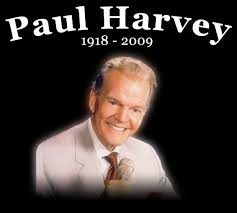When I was a kid, my parents would listen to country music on the radio. These were the days of the Oak Ridge Boys, Kenny Rogers and Dolly Parton, and Alabama. While I remember listening to many of those country songs when we would be in the car, that's not what I loved most about those country stations. If we happened to be in the car at noon or about 3:00 in the afternoon a familiar voice would come across the airwaves. It was a comforting voice. Since both of my grandfathers had died before I was born, I imagined that the man on the other side of the radio was what a grandfather sounded like. He was trustworthy, dependable, and so full of brilliant wisdom. That man was none other than Paul Harvey.
 |
|
One of my favorite things that he would do was his "rest of the story." I'm sure you all remember that segment. He would find some well-known event, person, or place and then tell some interesting background about it. Many times as he told the story, I would sit quietly trying to figure out what the rest of the story was before he finished. I felt like a detective, actively piecing together the clues in order to solve the case.
Sometimes when I read through Scripture, I wish I could hear Paul Harvey's voice come across and tell me the rest of the story. I came across one of those passages this week while I was preparing for my sermon. In St. Luke 9, there is an interesting commentary from the writer about Herod. Tucked away between a story about Jesus sending out the twelve on a mission trip and a story about Jesus feeding 5,000 men is an odd paragraph consisting of three verses. "Now Herod the ruler heard about all that had taken place, and he was perplexed, because it was said by some that John had been raised from the dead, by some that Elijah had appeared, and by others that one of the ancient prophets had arisen. Herod said, 'John I beheaded; but who is this about whom I hear such things?' And he tried to see him."
When I read those words, I wondered why Jesus wouldn't go see Herod. After all, if Herod is the ruler of Judea, wouldn't it have been beneficial to have him on Jesus' side? Couldn't Jesus go in for an afternoon and visit with this man? Why wouldn't Jesus go up to the palace and heal a couple of sick folks, drive out a few demons, and maybe even transfigure himself right there? Then Herod would believe and the people would actually be better off.
But since I had a sermon to prepare, I really didn't have time to contemplate this short passage too long and I moved forward. In the midst of my studying about the transfiguration of Christ and the implication of that transfiguration on both his early disciples and on us, it hit me. The rest of the story started to form my understanding of why Jesus did what he did. In verses 37-43a, Jesus casts out a demon from a boy. After he does so, we are told that "...all were astounded at the greatness of God." The miraculous things that Jesus did pointed to God's greatness, but his power really wasn't found there. God's true power is found in verses 43b and 44, "While everyone was amazed at all that he was doing, he said to his disciples, 'Let these words sink into your ears: The Son of Man is going to be betrayed into human hands.'"
Real power from God means that you continue to do what's right even in the midst of opposition. Real power from God means that you lower yourself and become a servant of others. Real power from God means that you are willing to be beaten, spat upon, kicked, harmed, and even killed for being a child of God. And real power from God means that you accept all of this because you are filled with joy, peace, patience, kindness, and most importantly love.
So while miracles, wonders, and signs point to God, they are not the end all of who God is. God is more completely found in the everyday. He is in the welcoming of strangers. He is in the care for the sick. He is in the humility of his people. He is most certainly in the poor, the prisoner, the naked, and the thirsty. That's why Jesus didn't go see Herod; there was no reason to. Jesus knew his mission and he knew his Father's heart. He didn't need a ruler's approval. And now you know the rest of the story...
Print Page